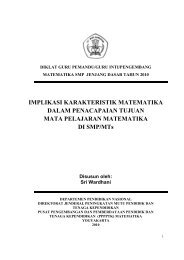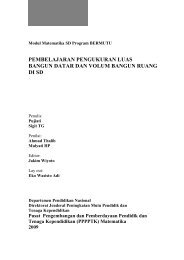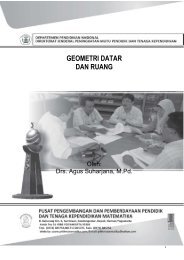- Page 3:
A tender rosebud on the verge of bl
- Page 6 and 7:
Contents Foreword . . . . . . . .
- Page 8 and 9:
Mistake 9: Deliberate Mistreatment
- Page 10 and 11:
Scenario 16.7: When the Bough Crack
- Page 12 and 13:
Foreword Anita Woolfolk Hoy The Ohi
- Page 14 and 15:
Preface to the Second Edition other
- Page 16:
About the Author Carolyn Orange, P
- Page 19 and 20:
2 25 Biggest Mistakes Teachers Make
- Page 21 and 22:
4 25 Biggest Mistakes Teachers Make
- Page 24:
1 DISCIPLINE
- Page 27 and 28:
10 Discipline on her. These extreme
- Page 29 and 30:
12 Discipline student another chanc
- Page 31 and 32:
14 Discipline SCENARIO 1.7 Water Sp
- Page 33 and 34:
16 Discipline know how to disciplin
- Page 35 and 36:
18 Discipline The worst experience
- Page 37 and 38:
20 Discipline SCENARIO 1.19 Biting
- Page 39 and 40:
22 Discipline The teacher was not m
- Page 41 and 42: 24 Discipline harassment that could
- Page 43 and 44: 26 Discipline likelihood that undes
- Page 45 and 46: 28 Discipline SCENARIO 2.2 Pit Bull
- Page 47 and 48: 30 Discipline SCENARIOS 2.5 and 2.6
- Page 49 and 50: 32 Discipline SCENARIO 2.9 Pupil Pl
- Page 51 and 52: 34 Mistake 3 Purposeful Alienation
- Page 53 and 54: 36 Discipline SCENARIO 4.2 Don’t
- Page 55 and 56: 38 Discipline SCENARIO 4.5 Old Scho
- Page 57 and 58: 40 Discipline Consummate profession
- Page 60 and 61: Mistake 5 Favoritism SCENARIO 5.1
- Page 62 and 63: Mistake 5: Favoritism said he recei
- Page 64 and 65: Mistake 6 Physiological Discrimina
- Page 66 and 67: Mistake 6: Physiological Discrimina
- Page 68 and 69: Mistake 6: Physiological Discrimina
- Page 70 and 71: Mistake 7 Personal Attacks SCENARI
- Page 72 and 73: Mistake 7: Personal Attacks The dic
- Page 74 and 75: Mistake 8 Inappropriate Teacher-St
- Page 76 and 77: Mistake 8: Inappropriate Teacher-St
- Page 78 and 79: Mistake 9: Deliberate Mistreatment
- Page 80 and 81: Mistake 10 Racial and Cultural Dis
- Page 82 and 83: Mistake 10: Racial and Cultural Dis
- Page 84 and 85: Mistake 10: Racial and Cultural Dis
- Page 86 and 87: Mistake 10: Racial and Cultural Dis
- Page 88 and 89: Mistake 11 Humiliation SCENARIO 11
- Page 90 and 91: Mistake 11: Humiliation what the co
- Page 94: 3 CLASSROOM POLICIES AND PRACTICES
- Page 97 and 98: 80 Classroom Policies and Practices
- Page 99 and 100: 82 Classroom Policies and Practices
- Page 101 and 102: 84 Classroom Policies and Practices
- Page 103 and 104: 86 Classroom Policies and Practices
- Page 105 and 106: 88 Classroom Policies and Practices
- Page 107 and 108: 90 Classroom Policies and Practices
- Page 109 and 110: 92 Classroom Policies and Practices
- Page 111 and 112: Mistake 13 Inappropriate Toileting
- Page 113 and 114: 96 Classroom Policies and Practices
- Page 115 and 116: 98 Classroom Policies and Practices
- Page 117 and 118: 100 Classroom Policies and Practice
- Page 120: 4 CLASSROOM MANAGEMENT AND INSTRUC
- Page 123 and 124: 106 Classroom Management and Instru
- Page 125 and 126: 108 Classroom Management and Instru
- Page 127 and 128: 110 Classroom Management and Instru
- Page 129 and 130: 112 Classroom Management and Instru
- Page 131 and 132: 114 Classroom Management and Instru
- Page 133 and 134: 116 Classroom Management and Instru
- Page 135 and 136: 118 Classroom Management and Instru
- Page 137 and 138: 120 Classroom Management and Instru
- Page 139 and 140: Mistake 15 Inappropriate Assessmen
- Page 141 and 142: 124 Classroom Management and Instru
- Page 143 and 144:
126 Classroom Management and Instru
- Page 145 and 146:
128 Classroom Management and Instru
- Page 148 and 149:
Mistake 16 Teacher Insensitivity S
- Page 150 and 151:
Mistake 16: Teacher Insensitivity G
- Page 152 and 153:
Mistake 16: Teacher Insensitivity S
- Page 154 and 155:
Mistake 16: Teacher Insensitivity m
- Page 156 and 157:
Mistake 16: Teacher Insensitivity a
- Page 158 and 159:
Mistake 17 Academic Shortcomings S
- Page 160 and 161:
Mistake 17: Academic Shortcomings I
- Page 162 and 163:
Mistake 17: Academic Shortcomings
- Page 164 and 165:
Mistake 17: Academic Shortcomings S
- Page 166 and 167:
Mistake 17: Academic Shortcomings t
- Page 168 and 169:
Mistake 18: Poor Administration can
- Page 170 and 171:
Mistake 19: Teacher Reputation stud
- Page 172 and 173:
Mistake 20: Teacher Misjudgment Inf
- Page 174 and 175:
Mistake 20: Teacher Misjudgment mor
- Page 176 and 177:
Mistake 20: Teacher Misjudgment SCE
- Page 178:
6 TEACHING STYLE AND BEHAVIOR
- Page 181 and 182:
164 Teaching Style and Behavior fri
- Page 183 and 184:
166 Teaching Style and Behavior Goo
- Page 185 and 186:
168 Mistake 22 Unethical Behavior
- Page 187 and 188:
170 Teaching Style and Behavior par
- Page 189 and 190:
172 Teaching Style and Behavior SCE
- Page 191 and 192:
174 Teaching Style and Behavior tea
- Page 193 and 194:
176 Teaching Style and Behavior SCE
- Page 195 and 196:
178 Mistake 24 Inappropriate React
- Page 197 and 198:
180 Teaching Style and Behavior (Sp
- Page 199 and 200:
182 Teaching Style and Behavior Chi
- Page 201 and 202:
184 Mistake 25 Sexual Harassment S
- Page 203 and 204:
186 Teaching Style and Behavior SCE
- Page 205 and 206:
188 Teaching Style and Behavior sch
- Page 208 and 209:
Teacher Confessions of Worst Treatm
- Page 210 and 211:
Teacher Confessions of Worst Treatm
- Page 212 and 213:
Teacher Confessions of Worst Treatm
- Page 214 and 215:
Teacher Confessions of Worst Treatm
- Page 216 and 217:
Teacher Confessions of Worst Treatm
- Page 218 and 219:
Teacher Confessions of Worst Treatm
- Page 220 and 221:
Teacher Confessions of Worst Treatm
- Page 222 and 223:
Teacher Confessions of Worst Treatm
- Page 224 and 225:
Teacher Confessions of Worst Treatm
- Page 226 and 227:
Teacher Confessions of Worst Treatm
- Page 228 and 229:
Teacher Confessions of Worst Treatm
- Page 230 and 231:
Teacher Confessions of Worst Treatm
- Page 232 and 233:
Teacher Confessions of Worst Treatm
- Page 234 and 235:
Teacher Confessions of Worst Treatm
- Page 236 and 237:
Teacher Confessions of Worst Treatm
- Page 238 and 239:
Teacher Confessions of Worst Treatm
- Page 240 and 241:
Teacher Confessions of Worst Treatm
- Page 242 and 243:
Teacher Confessions of Worst Treatm
- Page 244 and 245:
Teacher Confessions of Worst Treatm
- Page 246 and 247:
Teacher Confessions of Worst Treatm
- Page 248 and 249:
Teacher Confessions of Worst Treatm
- Page 250 and 251:
Teacher Confessions of Worst Treatm
- Page 252 and 253:
Teacher Confessions of Worst Treatm
- Page 254 and 255:
Teacher Confessions of Worst Treatm
- Page 256 and 257:
Teacher Confessions of Worst Treatm
- Page 258 and 259:
Teacher Confessions of Worst Treatm
- Page 260 and 261:
Teacher Confessions of Worst Treatm
- Page 262 and 263:
Teacher Confessions of Worst Treatm
- Page 264 and 265:
Teacher Confessions of Worst Treatm
- Page 266 and 267:
Teacher Confessions of Worst Treatm
- Page 268 and 269:
Teacher Confessions of Worst Treatm
- Page 270 and 271:
Teacher Confessions of Worst Treatm
- Page 272 and 273:
References American Association of
- Page 274 and 275:
References Henson, D. T., & Eller,
- Page 276 and 277:
References Vygotsky, L. S. (1993).
- Page 278 and 279:
Index Behavioral outcomes of mistre
- Page 280 and 281:
Index 263 public ridicule, 36-37 te
- Page 282 and 283:
Index Loss of control, 148-149 Lyin
- Page 284 and 285:
Index Self-competition, 82 Self-eff
- Page 288:
The Corwin Press logo—a raven str





